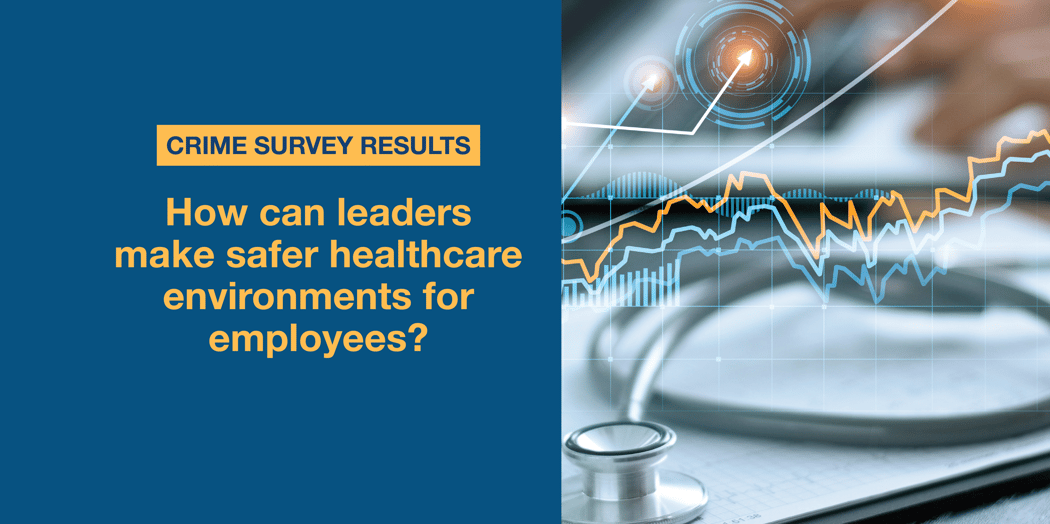Incident Management , Education , Healthcare , Corporate , Safer Communities
How can leaders make safer healthcare environments for employees?

Over the years, we have seen increases in crime, security incidents, and workplace violence across industries. The alarming growth in workplace violence figures has called on industry leaders to take steps to protect employees from becoming victims of violent acts at work.
We gained an understanding of current healthcare crime trends through the IAHSS Foundation’s 2020 Healthcare Crime Survey.
Findings show that:
- Workplace violence directed at employees is increasing. In 2019, assault and aggravated assault rates against employees were 1.5 and 0.5 per 100 employees, respectively, which is a significant rise compared to 2018, when rates were 1.2 and 0.2 per 100 employees.
- Workplace violence directed at employees continues to dominate the other types of workplace violence. Workplace violence with aggravated assaults directed at employees by patients or visitors accounted for 78% of all aggravated assaults and 85% of all assaults in U.S. hospitals.
- A small number of hospitals are leveraging walk-through metal detector systems. Eight percent of hospital participants use walk-through metal detectors to screen visitors and patients as they entered the hospital 24/7 in 2019.
- Few hospitals reported positive impacts of 24/7 use of walk-through metal detectors. Of those using walk-through metal detectors, 16 reported having a positive effect on crime, security incidents, and workplace violence. Some noted a decline in theft and the removal of weapons and weaponizable items from patients and visitors. Only three hospitals reported no impact.
During this time of great uncertainty in the healthcare sector, healthcare organizations have a heightened awareness of keeping employees safe in the workplace.
How can the surge in workplace violence be addressed?
Healthcare providers can seize the opportunity to empower employees with safety tools and training. Healthcare leaders may want to consider improving options for reporting and de-escalating incidents. An essential element of a holistic approach to violence prevention is effectively leveraging existing data.
Providers need to enable situational awareness
Training employees on recognizing an event about to escalate equips them with the necessary tools to reduce the likelihood of incidents, minimize damage, and protect themselves with increased situational awareness.
Employee training can help prevent workplace violence
Workplace violence prevention should not be an afterthought within healthcare environments. Companies tend to provide workplace violence prevention training, one time immediately after an incident occurs. Healthcare leaders should have policies, procedures, and training to prevent incidents from occurring and prepare employees should another incident occur.
Streamlining workplace violence reporting
Omnigo’s Records Management System allows organizations to fully document workplace violence events by recording the type of violence, people involved, use of weapons, any sustained injuries, and actions taken. You can quickly extract this information using Omnigo’s robust analytics to identify trends, manage resources, and provide critical information to leadership.
Empower the community for improved healthcare environment safety
To ensure healthcare safety, providers and care professionals can turn to safety awareness mobile solutions such as Omnigo Community, which provides a quick, anonymous way for staff, patients, and other stakeholders to communicate with healthcare safety departments. The app empowers the healthcare community to take an active role in improving safety in the healthcare environment.
By keeping detailed records of workplace violence, healthcare providers can effectively identify warning signs before a situation escalates to a violent incident. Omnigo provides fully integrated solutions that can assist with prevention, detection, reporting, response, and remediation, enhancing your employees, patients, and visitors’ safety.
Learn more about Omnigo’s workplace violence prevention solutions or contact us at 1-866-421-2374.
More from the blog
View All Posts
How are you addressing your workplace violence challenges?
Read More
The Fight Against Workplace Violence in Healthcare. What You Need to Know!
Read More
Can Incident Reporting Improve Workplace Safety in Healthcare?
Read MoreSubscribe to email updates
Stay up-to-date on what's happening at this blog and get additional content about the benefits of subscribing.
